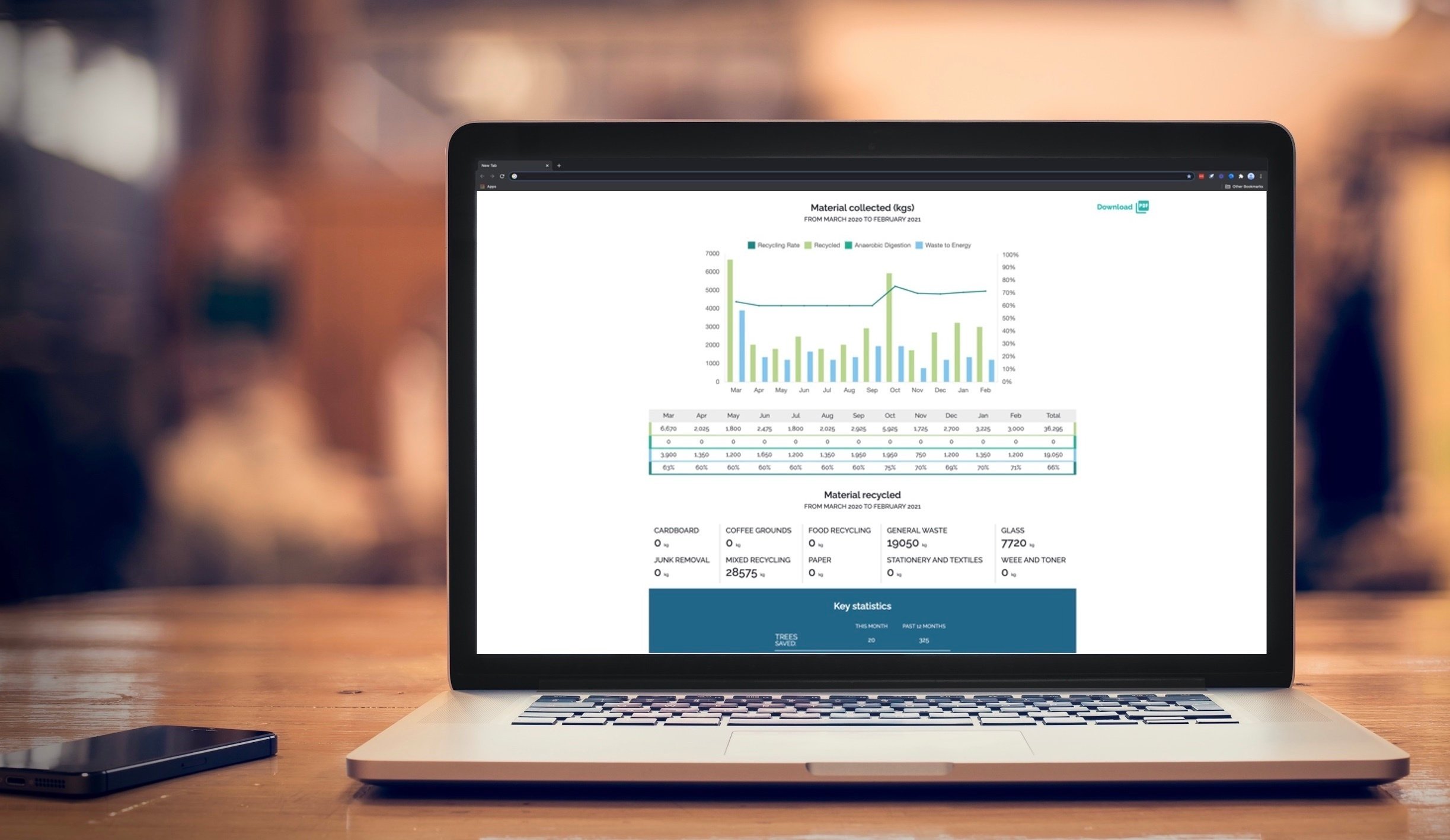Imagine if your recycling could sort itself, tell you when bins were full, and prove that everything was properly recycled, all without you lifting a finger. Thanks to AI and IoT, that’s no longer a fantasy. It’s already happening in many forward-thinking UK-based businesses.
Business waste recycling is getting smarter. With the help of Artificial Intelligence (AI) and the Internet of Things (IoT), UK companies are now cutting costs, increasing recycling rates, and making compliance easier, all while reducing their environmental impact.
These developments may sound technical, but their benefits are very real. From smart bins to automated sorting lines, they’re helping businesses reduce waste, track it more accurately, and meet new sustainability regulations without the hassle.
At First Mile, we’re here to make this shift simple. Whether you run a retail business, manage an office or lead on sustainability, we’ll help you unlock the power of AI and IoT — so you can waste less, recycle more, and stay 100% zero to landfill.
What do AI and IoT mean for business waste recycling?
You’ve probably heard the terms AI and IoT, but what do they actually mean for your business waste?
Put simply, AI is smart software that can “see”, learn and make decisions fast. It’s often used with high-speed cameras and sensors to identify different materials on recycling lines, improving sorting accuracy and speed. The Internet of Things (IoT), on the other hand, connects everyday objects like bins and skips to the internet using sensors, so they can share useful information in real time.
In waste management, that means bins that know when they’re full, vehicles that show exactly where your waste went, and systems that help recyclers separate materials more effectively.
Together, AI and IoT remove friction from business waste recycling. They make the process more efficient, transparent and trackable, and they’re already being used in UK recycling facilities today.
For your business, that translates into less waste to landfill, more materials recovered, and better data for sustainability reports. First Mile makes it easy to tap into these tools as part of our expert, zero-to-landfill service.
Smarter sorting with AI‑driven recycling systems
Sorting recyclables by hand can be slow, prone to mistakes, and often lets valuable material slip through the cracks. AI brings real change by using high-definition cameras, sensors, and smart algorithms to identify and separate items rapidly and accurately.
In the UK, recycling rates for paper and cardboard hover around 70.6%, meaning nearly a third of that waste still ends up unrecycled due to contamination or poor sorting. AI-powered systems help close that gap by delivering cleaner material streams, so more of what you throw away becomes a useful resource, not landfill.
AI in waste management also brings practical benefits beyond recycling rates. By tagging and tracking material flows with real-time data, it makes sorting centres more efficient and helps reduce operational hiccups. The result is faster throughput, higher quality recycled materials, and less waste slipping through the system.
For your business, that means:
- Better recovery of paper, cardboard, plastics, and other recyclables
- Cleaner sorting with lower contamination
- Faster processing for your waste, helping keep collections timely and effective
At First Mile, we use forward-thinking, smart waste sorting as part of our service, helping ensure your zero-to-landfill recycling promise isn’t just a goal but an everyday reality.
IoT-enabled tracking for transparency and efficiency
What if your bins could tell you when they were full, or if you had a live map showing exactly where your waste was going? That’s the power of IoT (Internet of Things), and it’s transforming waste management for UK businesses.
In simple terms, IoT uses sensors to connect bins, skips and vehicles to the internet. These smart devices collect real-time data about how much waste is being generated, when collections are needed, and where every load ends up.
This means fewer missed pickups, more efficient collections, and better use of resources. Smart bins can alert your waste provider when they’re full, reducing unnecessary trips and helping cut down on emissions. GPS tracking ensures every collection is accounted for, and you get a clear audit trail that proves your waste was handled properly.
Beyond the obvious benefits for a business’s sustainability goals, it’s also becoming more important for ESG reporting and compliance. With live data on collections and waste types, your reports become easier, faster and more reliable.
In the UK, platforms like PIN IoT are already being used to improve asset tracking and reduce waste crime by monitoring movements in real time. This helps ensure waste is going where it should, not being dumped illegally or misreported.
The rise of digital waste tracking in the UK
From 2026, all UK businesses will be required to comply with the government’s new Digital Waste Tracking (DWT) system. This nationwide platform will record all waste movements digitally, replacing the current paper-based system.
For businesses, that means a big shift in how you manage and report waste. But with the right tools in place, it doesn’t have to be difficult.
AI and IoT can help make compliance seamless. Smart sensors and GPS tracking can automatically log when waste is collected, what type it is, and where it’s taken. Instead of filling in paperwork or chasing down reports, you’ll have everything recorded in real time, with a clear digital audit trail to back it up.
This means:
- Less admin and manual reporting
- Easier audits and inspections
- Clear proof of sustainable waste management
The goal of DWT is to improve accountability and cut down on waste crime, making sure waste ends up where it should. At First Mile, we’re already working in line with these changes, helping businesses stay ahead of new rules with digital reporting and transparent waste tracking.
When 2026 comes, you’ll be ready with the data and systems you need to stay compliant, efficient, and sustainable.

Why this matters for your business
With AI and IoT onboard, you have practical tools that can make your business waste recycling easier, cheaper and greener.
Thanks to smarter sorting, more of your recycling gets recovered and reused, meaning less waste to landfill and better environmental outcomes. With IoT tracking, you gain full visibility of your waste journey, making audits and reporting much simpler. And with digital records, you’re always ready for new rules and regulations, like the government’s Digital Waste Tracking system coming in 2026.
For your business, this adds up to real benefits. You can save money through more efficient collections, while also improving recycling rates and cutting down on contamination. Reduced collection trips mean a smaller carbon footprint. And with clear, trustworthy data, you can confidently demonstrate your sustainability performance to customers, stakeholders and regulators.
We make all of this simple at First Mile. Our tech-enabled services combine AI-driven sorting, IoT-powered tracking and clear reporting, all backed by our zero-to-landfill guarantee.
So whether you're running a shop, managing a workspace, or leading on sustainability, we’ll help you take control of your waste and turn it into something positive.
AI and IoT are already changing UK business recycling, making it smarter, reporting easier, and sustainability goals more achievable. These tools aren’t the future. They’re available now, helping businesses like yours waste less and do more for the planet.
With First Mile, sustainable waste solutions are within easy reach. Our services use the latest tech to deliver zero-to-landfill recycling with full transparency and expert support.
Want to know what’s possible for your business? Chat to our team about making your business waste smarter, greener, and 100% zero to landfill.


